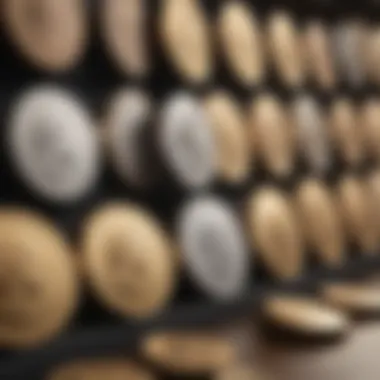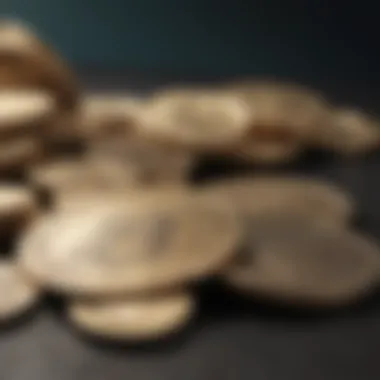Your Comprehensive Guide to Buying Coins Online: Everything You Need to Know


What is how to buy coins online:
When considering how to buy coins online, it is essential to understand the foundation and key components of this process. This mechanism was originally created by experts in the field of numismatics and cryptocurrency to provide individuals with a convenient and efficient method of acquiring rare or popular coins from the comfort of their homes.
The concept of how to buy coins online has evolved over time, leading to the development of numerous platforms and marketplaces specializing in the sale and purchase of a vast array of coins. From ancient currencies to modern commemorative pieces, there is a wide selection available for collectors and enthusiasts.
The primary purpose of how to buy coins online is to offer a seamless and secure way for individuals to enhance their coin collections or acquire specific pieces of interest. Through online platforms, buyers can browse through a diverse range of coins, conduct research on their authenticity and historical significance, and complete transactions efficiently.
In the realm of how to buy coins online, the tokenomics are influenced by various tokens that serve different functions within the ecosystem. These tokens facilitate transactions, provide rewards to users, and contribute to the overall operation and sustainability of the online coin purchasing system.
Furthermore, the ecosystem of how to buy coins online incorporates tools such as secure payment gateways, escrow services, coin authentication mechanisms, and portfolio management features. These tools enhance the user experience and ensure that buyers can engage in online coin transactions with confidence and ease.
The decision to swap coins through how to buy coins online rather than engaging in traditional trading methods is based on the distinct difference between the two approaches. Swapping coins involves a direct exchange between parties, allowing individuals to acquire specific coins they desire without the complexities associated with trading on conventional platforms.
To buy coins online, individuals can follow a straightforward process that typically involves creating an account on a reputable coin marketplace, browsing through coin listings, conducting research on desired coins, verifying seller credibility, finalizing the purchase through secure payment methods, and arranging for secure storage or delivery of the acquired coins.
Researching Coins Online
When it comes to buying coins online, the first crucial step is conducting thorough research. Understanding the various elements involved in researching coins online is paramount to making informed purchasing decisions. By delving into the realm of coin types, values, and authenticity, buyers can navigate the vast landscape of online coin marketplaces with confidence.
Understanding Coin Types
Exploring different coin types is essential for collectors and investors alike. Historic coins, with their intrinsic historical value, offer a glimpse into the past, making them not just collectibles but tangible pieces of history. Collectible coins, on the other hand, cater to enthusiasts seeking unique and limited-edition pieces to add to their collections. Bullion coins, prized for their precious metal content, serve as a tangible investment in the volatile market. Rare coins, with their scarcity and demand, present an opportunity for significant returns for astute collectors.
Historic Coins
Historic coins hold a special place in the hearts of numismatists and history buffs. Their historical significance, whether tied to ancient civilizations or pivotal periods in modern history, adds a layer of intrigue to their monetary value. Collectors gravitate towards historic coins for their storytelling ability, as each coin encapsulates a moment in time, preserving it for future generations.
Collectible Coins
Collectible coins appeal to buyers looking for unique and artistically crafted pieces. These coins often feature intricate designs, limited mintage numbers, and thematic relevance that capture the attention of numismatic enthusiasts. Collectible coins go beyond mere monetary value, offering a cultural and aesthetic experience that elevates the act of collecting to an art form.
Bullion Coins
For those looking to invest in tangible assets, bullion coins reign supreme. Their intrinsic value lies in the precious metals they contain, such as gold, silver, platinum, and palladium. Bullion coins offer a hedge against economic uncertainties and inflation, making them a popular choice for investors seeking stability in their portfolios.
Rare Coins


Rare coins are synonymous with exclusivity and desirability in the numismatic world. Their limited availability, combined with high demand, elevate their value significantly. Rare coins present a unique opportunity for investors and collectors to own coveted pieces of history that appreciate in worth over time.
Researching Coin Values
Determining the value of coins is a critical aspect of the purchasing process. By utilizing price guides, checking online auctions, and consulting with experts, buyers can gain insights into the market value and authenticity of the coins they intend to purchase.
Utilizing Price Guides
Price guides serve as valuable resources for understanding the current market value of coins. These guides provide pricing information based on factors such as condition, rarity, and demand, enabling buyers to make informed decisions when negotiating prices or placing bids.
Checking Online Auctions
Online auctions offer a convenient platform for buying and selling coins. By participating in auctions, buyers can explore a wide range of coins from various sellers and gauge market trends. Vigilance is key when engaging in online auctions to ensure authenticity and fair pricing.
Consulting with Experts
Seeking advice from numismatic experts can further enhance a buyer's understanding of coin values. Experts can provide insights into market trends, price evaluations, and authenticity assessments, guiding buyers towards making smart investment choices. Consulting with experts adds a layer of reassurance and knowledge to the coin purchasing experience.
Checking Authenticity
Ensuring the authenticity of purchased coins is a fundamental aspect of online buying. Through certification programs and third-party authentication services, buyers can validate the genuineness of coins and safeguard themselves against counterfeit or misrepresented items.
Certification Programs
Certification programs offer a standardized method of authenticating coins. By grading the condition and authenticity of coins, these programs provide buyers with a level of trust and confidence in their purchases. Coins certified by reputable grading agencies carry a premium and are highly sought after by collectors.
Third-Party Authentication
Third-party authentication services provide an additional layer of verification for coins. These services specialize in verifying the authenticity of coins through advanced testing and verification methods. Utilizing third-party authentication adds an extra level of security to the coin buying process, giving buyers peace of mind regarding the legitimacy of their acquisitions.
Choosing a Reputable Online Seller
When delving into the world of online coin purchasing, selecting a reputable seller is crucial to ensure a smooth and secure transaction. The choice of seller can greatly impact the quality and authenticity of the coins acquired. An essential aspect to consider when choosing a reputable online seller is evaluating their reputation, as this can provide insights into their trustworthiness and reliability. By opting for established and well-reviewed sellers, buyers can mitigate the risk of potential scams and counterfeit coins.
Evaluating Seller Reputation
Reviews and Ratings
Reviews and ratings play a pivotal role in evaluating a seller's reputation. They offer firsthand experiences from previous buyers, shedding light on the seller's credibility and the quality of their offerings. Positive reviews and high ratings are indicative of a trustworthy seller with a track record of delivering authentic coins and exceptional service. However, it is essential to discern genuine feedback from potentially fake or biased reviews to make informed decisions.


Length of Establishment
The length of establishment is another crucial factor when it comes to evaluating seller reputation. Established sellers with a long history in the industry are more likely to have a solid reputation and a loyal customer base. Their longevity demonstrates a commitment to excellence and customer satisfaction, instilling confidence in prospective buyers. Opting for well-established sellers can enhance the overall buying experience and reduce the likelihood of encountering fraudulent sellers.
Professional Memberships
Professional memberships further validate a seller's credibility and expertise in the coin trading sector. Membership in reputable numismatic associations or industry organizations signifies a commitment to upholding industry standards and ethics. Sellers with professional memberships are more likely to adhere to strict guidelines and regulations, ensuring a transparent and secure transaction process for buyers. Prioritizing sellers with relevant professional affiliations can offer additional assurance of authenticity and professionalism in the online coin purchasing journey.
Ensuring Transaction Security
Ensuring transaction security is a critical aspect of purchasing coins online. In the realm of online transactions, where sensitive information is exchanged, ensuring the security of financial details and personal data is paramount. By focusing on elements such as secure website indicators, avoiding suspicious websites, and creating strong passwords, buyers can safeguard themselves against potential threats and scams.
Secure Website Indicators
SSL Encryption
SSL Encryption is a key component in ensuring the secure transmission of data over the internet. This cryptographic protocol establishes a secure connection between a web server and a browser, protecting sensitive information such as credit card details and login credentials. One of the essential characteristics of SSL Encryption is its ability to encrypt data, making it unreadable to anyone intercepting the information. This feature enhances the overall security of online transactions, making it a popular choice for safeguarding financial interactions.
Padlock Symbol
The Padlock Symbol signifies a secure connection between a user's browser and a website. When this symbol is displayed in the address bar, it indicates that the website is using SSL/TLS encryption to protect data transfer. The presence of the padlock symbol instills confidence in buyers by assuring them that their information is transmitted securely. While the padlock symbol is widely recognized as a symbol of security, it's essential to note that its absence can raise red flags about the legitimacy of a website.
Trust Seals
Trust seals are visual indicators displayed on websites to establish trustworthiness and security. These seals are issued by third-party services to verify the authenticity and security of a website. The presence of trust seals can provide reassurance to buyers regarding the credibility of the online seller. One of the unique features of trust seals is their ability to enhance consumer trust and confidence in the integrity of the website. While trust seals can improve trust levels, it's important to verify the legitimacy of these seals to avoid falling prey to counterfeit markers of security.
Avoiding Suspicious Websites
Check Domain Authenticity
Checking the authenticity of a website's domain is crucial in avoiding fraudulent websites. Verifying the legitimacy of a website's domain name helps buyers discern between genuine online sellers and potential scammers. By examining the domain structure, expiration date, and ownership details, buyers can assess the credibility of the website. One of the key characteristics of authentic domains is consistent branding and reputable hosting services. While checking domain authenticity is a beneficial practice, it requires vigilance to detect subtle variations or imitations crafted by malicious entities.
Verify Contact Information
Verifying the contact information provided on a website is essential for establishing communication channels and resolving potential issues. Authentic online sellers typically offer valid contact details, including phone numbers, email addresses, and physical addresses. By confirming the legitimacy of these contact points, buyers can ensure that there is a means of recourse in case of disputes or discrepancies. The unique feature of verified contact information is its role in fostering transparency and accountability in online transactions. While verifying contact information is advantageous, buyers should remain cautious of websites that provide limited or evasive contact details.
Creating Strong Passwords


Combination of Letters, Numbers, and Symbols
Utilizing a combination of letters, numbers, and symbols in passwords contributes to their strength and complexity. Strong passwords are essential for safeguarding online accounts and preventing unauthorized access. The key characteristic of this approach is the enhanced resilience it provides against brute-force attacks and password cracking techniques. The unique feature of incorporating varied elements in passwords is the increased security fortification, reducing the likelihood of account breaches. While using a combination of characters is beneficial for enhancing password strength, users should balance complexity with ease of memorization to ensure convenient access to their accounts.
Avoiding Personal Information
Avoiding the inclusion of personal information in passwords mitigates the risk of identity theft and unauthorized access. Personal details such as names, birthdates, or addresses can make passwords vulnerable to guessing or social engineering attacks. By refraining from using easily obtainable information in passwords, users can enhance the security of their online accounts. The key characteristic of excluding personal details from passwords is the reduction of predictability, making it challenging for malicious actors to compromise accounts. While avoiding personal information is a prudent security measure, users should also implement periodic password changes and multi-factor authentication for added protection.
Storing Purchased Coins Securely
In the realm of purchasing coins online, one crucial aspect that often gets overlooked is the secure storage of these acquired treasures. Properly storing purchased coins is essential to maintain their value and integrity over time. Without adequate protection, coins can suffer damage, tarnishing, or loss of collectible value. Hence, understanding how to store coins securely is a significant component of the entire buying process.
Optimal Storage Solutions
Safety Deposit Box
When it comes to safeguarding valuable coins, a safety deposit box offers unparalleled security and peace of mind. Safety deposit boxes are typically housed in bank vaults, providing a high level of protection against theft, fire, and environmental hazards. Their secure, off-site location ensures the safety of your coins, reducing the risk of loss or damage from domestic incidents.
A key characteristic of safety deposit boxes is their privacy and confidentiality. Only authorized individuals can access the box, ensuring the coins remain confidential and secure. While safety deposit boxes offer top-tier protection, they may come with limitations on access times and potential costs for rental.
Coin Albums
Coin albums are a popular choice among collectors due to their organization and display capabilities. These albums often have designated slots for different coins, allowing for easy categorization and viewing of a collection. Coin albums usually come in various sizes and designs, catering to different coin types and storage needs.
One unique feature of coin albums is their ability to protect coins from environmental elements such as dust and scratches. They also provide a convenient way to showcase and organize a coin collection. However, coin albums may not offer the same level of security as safety deposit boxes, making them more suitable for everyday viewing and storage at home.
Air-Tite Holders
For individual coin protection, air-tite holders are a go-to solution. These holders are typically made of durable materials and provide an airtight seal around the coin, preventing exposure to air, moisture, and contaminants. Air-tite holders come in various sizes to accommodate different coin diameters and thicknesses.
The key characteristic of air-tite holders is their ability to preserve coin condition and prevent damage over time. They are ideal for storing high-value or rare coins that require extra care. While air-tite holders excel in physical protection, they may lack the display capabilities of coin albums and are more suitable for long-term storage.
Maintaining Proper Conditions
Temperature and Humidity Control
Controlling temperature and humidity levels is paramount in preserving coin quality. Fluctuations in temperature and humidity can lead to corrosion, toning, or deterioration of coins. By maintaining stable environmental conditions, collectors can ensure the longevity and aesthetics of their coin collection.
The key characteristic of temperature and humidity control is its ability to prevent chemical reactions that harm coins. Consistent levels of temperature and humidity protect coins from degradation and preserve their appearance and value. However, implementing temperature and humidity control measures may require additional investments in climate control equipment.
Avoiding Direct Sunlight
Direct sunlight exposure can result in fading, discoloration, or damage to coins. Shielding coins from UV rays is essential to prevent these adverse effects and maintain their original luster and quality. Avoiding direct sunlight ensures that coins retain their visual appeal and value over time.
The key characteristic of avoiding direct sunlight is its simple yet effective way of protecting coins from light-induced damage. By keeping coins in shaded areas or enclosed storage units, collectors can prevent sun-related deterioration and ensure the longevity of their prized possessions.







